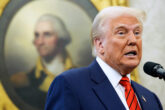March 28, 2021
Afghanistan Pullout Isn’t as Popular as It Seems
President Biden inherited a peace agreement requiring a complete withdrawal of American troops from Afghanistan. Now he faces two unattractive alternatives: Leave by May 1, as the deal with the Taliban requires, and risk governmental collapse and civil war. Stay, with or without a negotiated extension, and face the outrage of a U.S. public exhausted by two decades of conflict. The domestic politics might seem straightforward, but as evidenced by the president’s announcement Thursday that it will “be hard to meet the May 1 deadline,” the situation is actually complicated.
Conventional wisdom holds that withdrawing from Afghanistan is popular. Polls show a majority of Americans, including veterans, favor bringing the troops home. Leaving Afghanistan is a priority for key Democratic constituencies and was backed explicitly by President Trump and his 2020 Democratic challengers. Mr. Biden himself promised during his campaign to end the “forever wars,” Afghanistan most prominent among them.
While the notion of ending the American role in Afghanistan resonates, and can even shift policy, it’s unlikely to move votes or affect candidates’ chances, presidential or otherwise.
Look closer, however, and domestic demand for an American withdrawal may not be strong as it seems. America’s cities aren’t roiled by protests against the war in Afghanistan the way they were during the Vietnam era. At the height of the war in Iraq, congressional majorities in both houses passed measures requiring an end to the American presence there. This time is different. In December, Congress passed a defense funding bill that blocked Mr. Trump’s order to pull 2,000 troops out of Afghanistan. A new Pew poll about Americans’ foreign-policy priorities finds that protecting against terrorist attacks, the central reason for staying in Afghanistan, remains near the top of the list. Reducing U.S. military commitments overseas came in 17th.
While the notion of ending the American role in Afghanistan resonates, and can even shift policy, it’s unlikely to move votes or affect candidates’ chances, presidential or otherwise. There have been moments in U.S. history when a candidate’s position on war determined his political fortunes. There have also been moments when presidents had to spend great political capital to maintain a war effort, as with Lyndon B. Johnson in Vietnam or George W. Bush in Iraq. This isn’t one of those moments.
Read the full article from The Wall Street Journal.
More from CNAS
-
Afghanistan: Why Does Trump Want to Retake Bagram Air Base?
Lisa Curtis, senior fellow and program director at the Center for a New American Security joined Deutsche Welle to discuss President Trump's comments on the U.S. regaining con...
By Lisa Curtis
-
A Failure to Plan: Examining the Biden Administration’s Preparation for the Afghanistan Withdrawal
Afghanistan, Iraq, and Vietnam. One failure is a horrible accident; two failures are a tragic coincidence; three failures are a disturbing trend that shows the U.S. government...
By Christopher D. Kolenda
-
Against All Odds
Eighteen months after taking power, the Taliban is intensifying its repression of Afghan civil society and cracking down on the rights and freedoms of all Afghans, especially ...
By Lisa Curtis, Annie Pforzheimer & Jan Mohammad Jahid
-
To Help Afghanistan, Engage Its Political Opposition
The effort to help Afghans shape a better alternative should begin now....
By Richard Fontaine & Lisa Curtis




